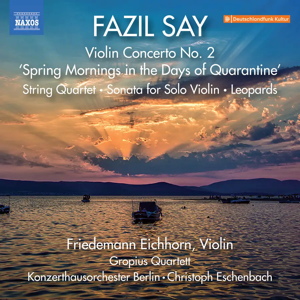
Fazıl Say (b. 1970)
Violin Concerto No.2, Op.87 ‘Karantina günlerinde bahar sabahlari’ (Spring Mornings in the Days of Quarantine) (2020)*
Leopards, Op.103 for string sextet (2022)*
Sonata for Solo Violin, Op.92c ‘Ruşen Güneş Anisina’ ‘In memoriam Ruşen Güneş’ (2020)*
String Quartet, Op.29 ‘Divorce’ (2010)
Friedemann Eichhorn (violin), Sào Soulez Larivière (viola), Maciej Kułakowski (cello)
Gropius Quartett
Konzerthausorchester Berlin/Christoph Eschenbach
rec. 2020-2023, Gewehrsaal, Schloss Ettersburg (quartet), Konzerthaus, Berlin (concerto), Festsaal Fürstenhaus, Hochschule für Musik Franz Liszt Weimar (others)
* First recordings
Naxos 8.574502 [65]
This recording is a perfect illustration of the phrase “It’s an ill wind that blows no one any good”, for two of the three world première recordings here were composed, as the English title of the violin concerto reads, ‘in the Days of Quarantine’, those strange times when many of us around the world were effectively imprisoned in our own homes. Fortunately, there was some relaxation of the regulations (which were different in different countries) and, in Turkish composer Fazıl Say’s case, permitted him to enjoy walks along the beach in the early morning during which he witnessed many sunrises, each with its unique aura and which are mirrored in his second violin concerto. Anyone coming upon Fazıl Say’s compositions for the first time is confronted by the richest of palettes, as Say is a modern example of Debussy whose gift was to be able to ‘paint’ in music and the wash of colour in his works is truly astonishing. It is no wonder the French newspaper Le Figaro called him ‘a genius’.
The violin concerto’s opening movement, a pastoral ‘Ballad of Aurora’ seems to describe one of those beautiful sunrises with plenty of sweep while the second is a jazz dance, perhaps mirroring the pleasure of escape from the confines of home. I remember how we appreciated things in a new and different way, when the skies were silent with no planes flying, while silence reigned on the ground too with no traffic, and few people about, an experience none of us had ever had before – strange times indeed, which are represented by the third movement which has the subtitle ‘Quiet morning’. The final movement ‘Sunrise’ also reflects those deserted streets and beaches in its final section in which the solo violin and with it, the concerto conclude, fading to a whisper.
Leopards, for string sextet, was commissioned by the Kronberg Academy, whose festival had the theme of protecting nature. Once, the composer and his daughter went on a safari and he was particularly taken with the leopards he saw whose every movement and speed made a lasting impression which he manages to articulate so vividly in this work. The birds in the trees can also be picked out easily, though the emphasis is on these magnificent creatures and Say’s unique compositional abilities allow him to portray the power in their strength and agility in a riveting way.
The following Sonata for solo violin is dedicated to Say’s close friend, violist Ruşen Güneş, who died in May 2020. Originally composed for viola, this is the version for violin, while a version for cello has also been made. Its two movements are powerful expressions of the obvious love and respect Say felt for his friend, at the same time expressing the violist’s obvious considerable ability as a musician.
The disc closes with the only work which is not a world première recording, Say’s string quartet, subtitled ‘Divorce’. Trying to paint a musical picture of a relationship and its unravelling must be a tall order but in the hands of Fazıl Say, little seems to present a challenge too far. From sorrow that the partnership is beginning to break down, through the search for a solution, to the worst period of recriminations and expressions of hatred and disgust, as well as the circular arguments that get nowhere and become an overwhelming nightmare, the music manages to successfully express this most destructive of human conditions that is said to be one of the worst experiences humans can go through. However, amazingly, its musical expression is thoroughly enjoyable – if traumatic.
This disc is an amazing experience and Fazıl Say, if you are new to him, is a revelation. The listener who does not already know of his music is advised to seek out his symphonies, No.2 ‘Mesopotamia’ and 3, ‘Universe’ in which they will discover more of his unique take on musical expression. There is no doubt, that once heard, listeners are likely to become ardent fans of this singularly and refreshingly different composer whose music grabs one firmly in its grip.
Steve Arloff
Buying this recording via a link below generates revenue for MWI, which helps the site remain free.




















